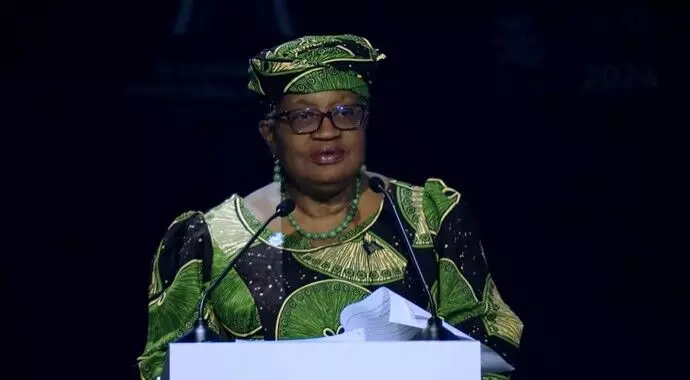
WTO Director-General warns of global trade challenges at 13th Ministerial Conference
text_fieldsNgozi Okonjo-Iweala, Director-General of the World Trade Organization (WTO), during the 13th WTO Ministerial Conference in Abu Dhabi today.
Abu Dhabi: Ngozi Okonjo-Iweala, Director-General of the World Trade Organization (WTO), mentioned the looming challenges facing global trade, indicating that the growth forecast for 2024 is expected to fall short due to various factors including slower economic growth and escalating geopolitical tensions. Ms Okonjo-Iweala was addressing the 13th WTO Ministerial Conference in Abu Dhabi today.
Okonjo-Iweala stated the significant impact of recent events such as the Red Sea crisis and disruptions in the Panama Canal, emphasizing their role in causing delays and inflationary pressures. These incidents serve as poignant reminders of the vulnerabilities inherent in the global trade system, particularly in the face of climate change.
The WTO had initially forecasted a robust 3.3 per cent growth in global trade for 2024, representing a marked improvement from the previous year's sluggish 0.8 per cent. But the unforeseen events including the Israel-Gaza war and attacks by Houthi in the Red Sea have added layers of complexity, hampered the smooth flow of trade routes and forced ships to seek alternative longer routes.
Geopolitical tensions, especially between major players like the United States and China, have exacerbated existing challenges, leading to a rise in protectionist policies that threaten the integrity of the multilateral trading system.
However, Okonjo-Iweala stated that the multilateral trading system has shown a lot of resilience and is delivering despite the challenges.
"Under the multilateral trading system with the WTO underpinning, it is still delivering 75 per cent of world trade, still on WTO terms. We just saw two new members, Comoros and Timor Leste, join the organisation and we have 22 more in the queue", said Okonjo-Iweala.
Dr. Thani Al Zeyoudi, Minister of State for Foreign Trade, echoed Okonjo-Iweala's sentiments, affirming the WTO's pivotal role in combating protectionism and promoting a rules-based trading environment. He highlighted the urgency of addressing pressing issues such as climate change, rising living costs, and debt burdens, which pose formidable obstacles to global economic development.
"We must show the world that the WTO is “alive and well” and can deliver results that matter to people, the conference must show that the multilateral trading system can and will contribute to development," he said.
Despite economic growth outperforming expectations in certain regions, concerns persist regarding the uneven recovery, particularly in developing countries grappling with debt distress and financing constraints. The International Monetary Fund (IMF) has revised its global economic growth forecast, anticipating a modest increase but warning of lingering risks amidst geopolitical uncertainties.
13th Ministerial Conference (MC13)
The 13th Ministerial Conference (MC13) of the World Trade Organisation (WTO) is a four-day event that brings together ministers and senior officials to discuss international trade rules and regulations. MC13 will focus on enhancing the access of developing countries and Least Developed Countries (LDCs) to the global trading system, intellectual property and WTO dispute resolution mechanisms.
Beyond governmental participation, MC13 presents a unique platform for fostering collaboration and partnership across various sectors. Side events scheduled throughout the conference provide an avenue for engaging with non-governmental organizations, the private sector and civil society. These interactions seek to enhance the effectiveness of trade policies and programs through shared insights and experiences.
























